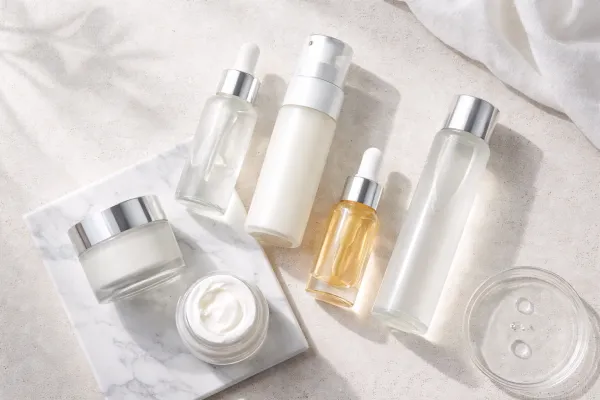Ceramides for Skin Barrier Health: Everything You Need to Know
Discover the power of ceramides for skin barrier health. Learn how these essential lipids hydrate, protect, and repair your skin for a radiant complexion.

Ever wondered why some people seem to have that naturally glowing, resilient skin, while others struggle with dryness, irritation, and sensitivity?
The secret might just lie in tiny, yet incredibly powerful molecules called ceramides. These are not some newfangled skincare fad, but rather, essential components of your skin’s natural defense system.
Think of them as the mortar that holds the bricks of your skin cells together, ensuring everything stays strong, hydrated, and protected. Without enough of them, your skin barrier can become compromised, leading to a whole host of issues.
Understanding the role of ceramides for skin barrier health is the first step towards achieving that healthy, radiant complexion we all desire.
Key Takeaways: Ceramides for Skin Barrier Health
- Ceramides are vital lipids that form a crucial part of the skin's protective barrier.
- They help maintain skin hydration by preventing moisture loss.
- Ceramides protect the skin from external irritants and pollutants.
- Using skincare products with ceramides can improve skin dryness, roughness, and sensitivity.
- Ceramides are beneficial for all skin types, including dry, oily, and sensitive skin.
The Crucial Role of Ceramides in the Skin Barrier
Let's dive deeper into what makes ceramides so important. Imagine your skin as a brick wall. The skin cells are the bricks, and the ceramides are the mortar that holds them together.
These lipids are a major part of the lamellar sheets found in the stratum corneum, which is the outermost layer of your skin. This layer is your first line of defense against the outside world.

Without sufficient ceramides, this "wall" becomes weak and porous, allowing moisture to escape and harmful substances to enter. This is why maintaining a healthy level of ceramides is absolutely essential for a strong and functional skin barrier.
The stratum corneum is made up of free fatty acids, cholesterol, and ceramides, all in roughly equal amounts. What's really fascinating is that ceramides are not all the same; they're a diverse group of sphingolipids, each with slightly different structures. This variation is key to their function, allowing them to create a robust and adaptable barrier.
Think of it like this: if you're building a house, you wouldn't use just one type of brick or one type of mortar. You'd use a variety of materials to make sure the structure is strong and can withstand different conditions.
Similarly, the variety of ceramides in your skin ensures it can handle all sorts of environmental challenges. This is why when the skin barrier is compromised, it can lead to a whole host of issues, including dryness, irritation, and even more serious skin conditions. So, ceramides aren't just a nice-to-have; they're a must-have for healthy skin.
- Ceramides are the main lipid components of the skin's outer layer.
- They form a protective barrier against external threats.
- The diversity in ceramide structure is crucial for their function.
- A deficiency in ceramides can lead to a compromised skin barrier.
Learn more about the skin barrier and its importance.
Hydration and Barrier Function: The Power of Ceramides
One of the most critical functions of ceramides is their ability to maintain skin hydration. They create a hydrophobic barrier, which means they repel water, preventing it from escaping from the epidermis. This is crucial because when your skin loses too much moisture, it becomes dry, flaky, and more susceptible to damage.

Think of it like a leaky bucket; if the bucket has holes, it doesn't matter how much water you pour in, it will just leak out. Similarly, if your skin barrier is compromised due to a lack of ceramides, the moisture you apply through your skincare routine will simply evaporate. This is why ceramides are such a powerful ingredient in moisturizers. They help to lock in moisture, keeping your skin hydrated and supple.
As we age, our natural production of ceramides decreases, making it even more important to replenish them through our skincare routines. Harsh soaps and exfoliants can also strip away ceramides, further compromising the skin barrier. This is why it's essential to use gentle cleansers and moisturizers that contain ceramides to maintain a healthy and hydrated complexion.
I remember when I first started learning about skincare, I was using all sorts of harsh products that would leave my skin feeling tight and dry. It wasn't until I understood the importance of ceramides that I realized I was actually doing more harm than good.
Once I switched to products that focused on supporting the skin barrier, my skin completely transformed. It became less reactive, more hydrated, and had a natural glow that I had never seen before. This experience really solidified for me the importance of ceramides in skincare.
- Ceramides enhance the skin's hydrophobic properties, preventing water loss.
- They are essential for maintaining optimal skin hydration.
- Aging and harsh products can deplete ceramide levels.
- Topical ceramides can improve skin hydration and elasticity.
Explore the best moisturizers for teenage skin that include ceramides.
Protective and Soothing Properties of Ceramides
Beyond hydration, ceramides also play a significant role in protecting your skin from external aggressors. They form a robust shield against harsh weather conditions, pollutants, and irritants. Think of them as the bodyguards of your skin, constantly working to keep out anything that could cause harm.
This protective function is particularly beneficial for those with dry and sensitive skin, as their skin barrier is often more vulnerable to these external factors. When the skin barrier is weakened, it can lead to redness, irritation, and flakiness.
By strengthening the barrier with ceramides, you can minimize these issues and achieve a more comfortable and soothed skin feel. This is why ceramides are often recommended for people with conditions like eczema and dermatitis, where the skin barrier is severely compromised.
They help to reduce inflammation and promote healing, allowing the skin to recover and function properly. It's not just about treating existing problems, but also about preventing future issues by keeping the skin barrier strong and resilient.
I've seen countless clients come in with skin that's constantly red and irritated, not realizing that their skin barrier is crying out for help. Often, they've been using harsh cleansers and exfoliants, further damaging their skin.
Once we introduce products with ceramides, the transformation is remarkable. The redness subsides, the irritation calms down, and the skin starts to heal. It's like giving the skin the tools it needs to protect itself.
- Ceramides protect the skin from external aggressors like pollutants and irritants.
- They minimize the risk of skin sensitivity and premature aging.
- Ceramides reduce redness, irritation, and flakiness.
- They are particularly beneficial for individuals with dry and sensitive skin.
Learn about skincare routines for sensitive skin that incorporate ceramides.
Ceramides: Benefits for All Skin Types
One of the great things about ceramides is that they are beneficial for all skin types, not just dry or sensitive skin. While they are particularly helpful for those with a compromised barrier, everyone can benefit from their hydrating and protective properties.

For individuals with oily or acne-prone skin, ceramides can help to balance the skin's barrier function, which can often be disrupted by harsh acne treatments. By keeping the skin hydrated, ceramides can also help to reduce the overproduction of oil, which can contribute to breakouts. Even those with normal skin can benefit from ceramides, as they help to maintain the skin's overall health and resilience.
The key is to choose products that are formulated with the right types and concentrations of ceramides. Look for products that list ceramides high up on the ingredient list, and avoid products that contain harsh ingredients that can strip away the skin's natural oils. It's all about finding the right balance and supporting your skin's natural functions.
I've seen so many people with oily skin shy away from moisturizers, thinking that they will make their skin even oilier. But the truth is, oily skin still needs hydration, and ceramides are a great way to provide that without clogging pores.
When you use a moisturizer with ceramides, you're not just adding moisture, you're also helping to regulate your skin's oil production. It's a game-changer for those who struggle with oily and acne-prone skin.
- Ceramides are beneficial for all skin types, including oily and acne-prone skin.
- They help balance the skin's barrier function.
- Ceramides can reduce oil overproduction in oily skin.
- They maintain the skin's overall health and resilience.
Explore acne treatment options for teenagers that complement ceramide use.
Clinical Evidence Supporting the Use of Ceramides
The benefits of ceramides are not just anecdotal; they are backed by solid scientific research. Numerous clinical studies have highlighted the efficacy of ceramides in improving skin barrier function.
A comprehensive review of 41 reports, including comparative control studies, demonstrated that external ceramide-containing preparations can significantly improve dry skin and barrier function, particularly in patients with atopic dermatitis and other skin disorders.
These findings underscore the clinical significance of incorporating ceramides into skincare products to enhance water retention and barrier function. This isn't just about feeling better; it's about improving the overall health of your skin at a cellular level.
The studies show that ceramides can reduce transepidermal water loss (TEWL), which is a measure of how much water is evaporating from your skin. By reducing TEWL, ceramides help to keep your skin hydrated and healthy.
The research also shows that ceramides can improve skin elasticity and alleviate skin conditions like eczema and dermatitis. This is why ceramides are such a trusted ingredient in dermatology and skincare.
As someone who's spent years researching skincare, I'm always looking for ingredients that are backed by solid science. Ceramides are one of those ingredients.
The clinical evidence is clear: they work. It's not just about marketing hype; it's about real, tangible results. When I recommend products with ceramides to my clients, I know that I'm recommending something that is both effective and safe.
- Clinical studies support the efficacy of ceramides in skincare.
- Ceramide-containing preparations improve dry skin and barrier function.
- They reduce transepidermal water loss (TEWL).
- Ceramides alleviate skin conditions like eczema and dermatitis.
Discover the best ingredients for skin barrier repair, including ceramides.
How to Incorporate Ceramides into Your Skincare Routine
Now that you understand the importance of ceramides, let's talk about how to incorporate them into your skincare routine. The good news is that ceramides are readily available in a variety of skincare products, including moisturizers, serums, and toners. When choosing products, look for those that specifically mention ceramides on the ingredient list.
It's also a good idea to choose products that contain a blend of different types of ceramides, as this will provide the most comprehensive benefits. Start by adding a ceramide-rich moisturizer to your daily routine. Apply it after cleansing and toning, and before applying any other products.
You can also incorporate a ceramide serum for an extra boost of hydration and protection. It's important to be consistent with your skincare routine to see the best results. Don't expect to see a dramatic change overnight, but with continued use, you will notice a significant improvement in your skin's hydration, texture, and overall health. Remember, skincare is a marathon, not a sprint.
One of the most common mistakes I see people make is trying to do too much too soon. They'll start using a bunch of new products all at once, and then wonder why their skin is freaking out. When introducing ceramides into your routine, start slowly. Add one new product at a time, and give your skin a chance to adjust. This way, you can see how your skin reacts and avoid any potential irritation.
- Ceramides are available in moisturizers, serums, and toners.
- Choose products that list ceramides high on the ingredient list.
- Incorporate a ceramide-rich moisturizer into your daily routine.
- Use a ceramide serum for an extra boost of hydration.
Create the ultimate AM and PM skincare routine, including ceramide products.
The Science Behind Ceramides: A Deeper Look
Let's take a moment to delve into the science behind ceramides. These complex molecules are a type of lipid, specifically a sphingolipid, which is a fancy way of saying they're a fat-like substance.
They are made up of a sphingosine base linked to a fatty acid. What's interesting is that the fatty acid can vary in length and structure, leading to a wide variety of different ceramides.
This diversity is crucial to their function, as each type of ceramide plays a slightly different role in the skin barrier. Some ceramides are better at preventing water loss, while others are better at protecting against external irritants. The ratio of different ceramides in your skin can also vary depending on your age, genetics, and environmental factors.
This is why it's important to choose products that contain a blend of different ceramides, rather than just one type. The more we understand about the science of ceramides, the better we can formulate skincare products that effectively support the skin barrier.
I'm always amazed by the complexity of the skin and how these tiny molecules can have such a profound impact on its health. It's like a finely tuned machine, where every part plays a crucial role. The more we learn about the intricacies of the skin, the better we can take care of it.
- Ceramides are complex sphingolipids with diverse structures.
- The variety in ceramide structure is crucial to their function.
- Different ceramides play different roles in the skin barrier.
- The ratio of ceramides can vary based on age, genetics, and environment.
Discover the best anti-aging ingredients that work synergistically with ceramides.
Ceramides vs. Other Moisturizing Ingredients
While there are many moisturizing ingredients out there, ceramides stand out for their unique ability to mimic the skin's natural lipids. Unlike humectants, which draw moisture from the environment, or emollients, which soften the skin, ceramides work to repair and strengthen the skin barrier itself.
This makes them particularly effective for those with a compromised barrier, as they address the root cause of dryness and sensitivity. Other moisturizing ingredients, such as hyaluronic acid and glycerin, are certainly beneficial, but they work in different ways.
Hyaluronic acid is a humectant that attracts moisture to the skin, while glycerin is an emollient that softens and smooths the skin. While these ingredients can provide hydration, they don't necessarily address the underlying issue of a weakened skin barrier.
This is where ceramides shine, as they not only hydrate the skin but also help to repair and strengthen the barrier, preventing future moisture loss. It's like the difference between putting a band-aid on a cut and actually healing the wound.
I often explain to my clients that skincare is like building a house. You need a strong foundation (the skin barrier), sturdy walls (ceramides), and a roof (moisturizers) to protect the inside. While other ingredients can help, ceramides are the key to building that strong foundation.
| Ingredient | Function | Primary Benefit |
|---|---|---|
| Ceramides | Repair and strengthen the skin barrier | Prevents moisture loss and protects against irritants |
| Hyaluronic Acid | Humectant | Attracts moisture to the skin |
| Glycerin | Emollient | Softens and smooths the skin |
Understand the difference between hydration and moisturization and how ceramides fit in.
Potential Side Effects and Precautions
While ceramides are generally considered safe for all skin types, it's always important to be aware of potential side effects and precautions.
In rare cases, some individuals may experience mild irritation or allergic reactions to ceramide-containing products. This is usually due to other ingredients in the product, rather than the ceramides themselves. To minimize the risk of irritation, it's always a good idea to do a patch test before using a new product on your entire face.
Apply a small amount of the product to a small area of skin, such as behind your ear or on your inner arm, and wait 24-48 hours to see if any redness, itching, or irritation develops.
If you experience any adverse reactions, discontinue use and consult with a dermatologist. It's also important to choose products that are formulated with high-quality ceramides and avoid products that contain harsh ingredients that can strip away the skin's natural oils.
Remember, skincare is about finding the right balance for your individual skin needs.
I've always been a big advocate for listening to your skin. If something doesn't feel right, don't ignore it. It's better to be cautious and do a patch test than to risk a full-blown allergic reaction. Skincare is a journey, and it's important to be patient and find what works best for you.
- Ceramides are generally safe but can cause mild irritation in rare cases.
- Always perform a patch test before using a new product.
- Discontinue use if any adverse reactions occur.
- Choose high-quality ceramide products.
Learn about skincare products to avoid for darker skin, as some ingredients can cause irritation.
The Future of Ceramides in Skincare
As our understanding of the skin barrier continues to evolve, so too will the role of ceramides in skincare. Researchers are constantly exploring new ways to harness the power of ceramides to improve skin health.
We're seeing more and more products that are formulated with a blend of different types of ceramides, as well as other barrier-supporting ingredients.
The future of skincare is all about personalization, and I believe that ceramides will play a key role in this trend. As we learn more about the unique needs of different skin types, we'll be able to create products that are tailored to individual needs. This will lead to more effective and targeted skincare solutions.
I'm excited to see what the future holds for ceramides and how they will continue to transform the way we approach skincare.
I've always been fascinated by the intersection of science and skincare. It's amazing to see how far we've come in our understanding of the skin and how we can use that knowledge to create better products.
Ceramides are a testament to this progress, and I'm confident that they will continue to be a cornerstone of effective skincare for years to come.
- Research is continuously exploring new ways to use ceramides.
- Personalized skincare will likely incorporate ceramides.
- The future of skincare will focus on targeted solutions.
- Ceramides will remain a key ingredient in effective skincare.
Learn how to start a skincare routine as a beginner, including the use of ceramides.
Conclusion
Ceramides are truly the unsung heroes of our skin. These essential lipids play a vital role in maintaining the health and integrity of the skin barrier. From hydrating and protecting to soothing and repairing, ceramides offer a multitude of benefits for all skin types.
By incorporating ceramide-rich products into your skincare routine, you can strengthen your skin barrier, prevent moisture loss, and protect against external aggressors.
The scientific evidence is clear: ceramides are not just a trend; they are a fundamental component of healthy, resilient skin. As we continue to learn more about the complexities of the skin, ceramides will undoubtedly remain a cornerstone of effective skincare.
So, if you're looking to achieve that healthy, glowing complexion, don't underestimate the power of ceramides. They are the key to unlocking your skin's true potential.
I've seen firsthand the transformative power of ceramides, and I'm confident that they can make a difference in your skin too.
Be patient, be consistent, and most importantly, listen to your skin.

Skin Care FAQs: No BS, Just Results 💡
Why does skin inflammation happen, and how do you fix it?
Skin inflammation isn't some mystery—it's your skin freaking out because of harsh products, UV rays, or straight-up neglect. The fix? Stop using junk skin care products and start supporting your skin barrier with anti-inflammatory creams and topical ceramides. They calm the itch and bring your barrier back to life like a reset button. Done.
What should you look for in skin care products that actually work?
Forget the fluff. Look for products with ceramides, antioxidants, and zero irritants. If the label doesn't scream "skin barrier support," skip it. These ingredients fix your natural skin barrier, boost ceramide levels, and keep your skin irritation-free. Your skin deserves quality, not garbage.
How do you stop your skin from aging faster than it should?
Aging isn't a death sentence—it's optional with the right game plan. Get serious about using skin-care products with SPF, ceramides, and stuff that supports skin cell turnover. Block those UV rays, protect your keratinocytes, and stop letting your barrier take a beating. Stay consistent, stay young.
Why does your skin get itchy, and how do you stop it?
Itchy skin? That's your barrier screaming, "Help me!" Dryness or irritation from weak skin care habits is the culprit. The solution? Barrier creams with topical ceramides. They repair the damage and keep your skin hydrated while tackling irritants like sunburn or even cosmetic product reactions. Simple fix, big results.
Why should you care about your skin barrier?
Your skin barrier is like a fortress—it keeps the bad stuff out and the good stuff in. Break it, and you're inviting irritation, aging, and even skin cancer. Build it back stronger with ceramide supplementation, topical applications, and smart choices. Strong barrier = happy skin.
Can sunburn be treated with skin care?
Yep. Sunburn is no match for anti-inflammatory products and ceramide creams. These bad boys work double-time to repair keratinocyte damage from UV rays and give your skin the hydration and protection it craves. Just apply, recover, and don't skip sunscreen next time.
What's the big deal about ceramides in skin care?
Ceramides are the MVP of your skin. They're lipids that make up your natural skin barrier and keep everything working. Low ceramides? You'll get dry, irritated, and old real fast. Boost them with ceramide supplementation and topical ceramides, and watch your skin glow like a pro.
How do you protect your skin from UV rays?
Let's not overcomplicate it—use sunscreen. Not just any sunscreen, though. Get a broad-spectrum SPF and pair it with ceramide-rich products for extra skin barrier support. This combo protects your keratinocytes, keeps your skin from aging, and helps avoid long-term damage like skin cancer.
What are dermatoses, and why should you care?
Dermatoses are skin conditions like eczema or psoriasis that wreck your barrier and confidence. The fix? Barrier creams, topical ceramides, and anti-inflammatory treatments. They tackle the root cause and keep your skin in the game. No frills, just results.
Why is ceramide supplementation a game-changer?
Think of ceramides as the secret weapon your skin can't live without. They boost hydration, strengthen your barrier, and accelerate skin cell turnover. Add them through high-quality skin care products, and you're not just fixing your skin—you're future-proofing it.





